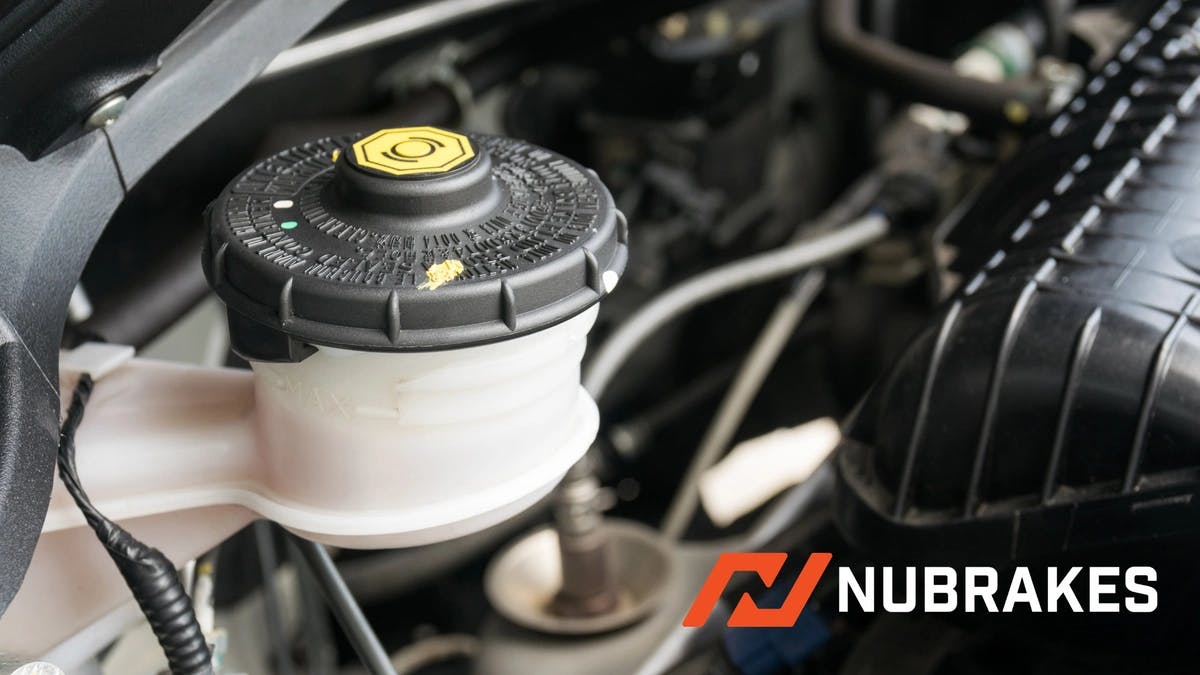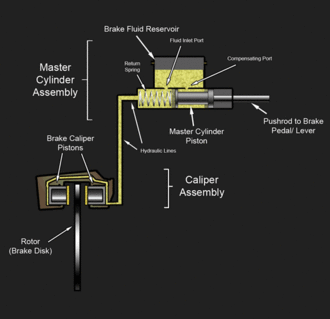What is Brake Fluid?
The brake fluid behind your brake pedal amplifies the stress on the brake pedal from your foot and enables you to stop a large fast-moving vehicle easily.
To keep this performance, your brake fluid must get serviced regularly.
Most people know that regular car maintenance includes verifying the brake pads. Squeaky brake pads draw attention and the car will take longer to stop than normally needed.
However, proper vehicle maintenance involves caring for your brake fluid to ensure safety on the road.
Key Takeaways:
|
Brake Fluid Overview
Your vehicle's brake pads are hydraulic, which means they work with a liquid called hydraulic fluid. Hydraulic fluid functions by converting a force, such as pushing the brake pedal, into pressure.
The brake fluid acts as a medium for the pressure required to engage a vehicle's front and rear brakes.
This is because liquids are not compressible, unlike air and some solid particles.
Brake fluid can be found in almost any motor vehicle, such as cars, trucks, motorcycles, and ATVs. Because of their efficiency and increased safety, hydraulic brakes are also used on pedal bicycles. Brake failure in any vehicle starts with low or dirty hydraulic fluid, specially designed to last a long time.
Source: Hydraulic Brake
Why You Should Change Brake Fluids
There are numerous working components in your brake system. A car generally has disc brakes in the front and either disc or drum brakes in the rear.
Everything is linked together by a network of hoses and pipes that connect the brakes at each wheel to the master cylinder. The overarching brake system includes the parking brake, brake control booster, and anti-lock system.
When you press the brake pedal, a piston pushes against the master cylinder, forcing brake fluid through the linked hoses to each wheel's braking system. The disc brakes force the fluid into a caliper, which presses against a piston, which pinches the brake pads against the disc and squeezes the wheel to slow down or stop.
Tiny bits of rubber, rust and other debris fall off as the brake system's elements get worse over time and can end up in your brake fluid. When this fluid becomes dirty, it loses effectiveness, causing your brakes to fail.
Furthermore, since brake fluid is hydrophilic, it absorbs 3% of its weight in water yearly, emphasizing the importance of changing brake fluid.
A brake fluid replacement helps you remove all the old, dirty brake fluid from your device and replace it with new, clean fluid.
A brake fluid flush should be included in your regular vehicle maintenance and must be performed every 30,000 miles.
Here are some other reasons you need to change your brake fluid regularly:
-
Brake fluid is "hygroscopic," which vigorously draws air moisture
Drawing in moisture is usually the primary reason to change your brake fluid. Since many components of your vehicle braking system are made of steel, changing the brake fluid can help prevent rust and failure.
-
The boiling temperature of brake fluid decreases as it ages and becomes polluted with small particles
Polluted brake fluid lessens your braking force, which you may not see for a while, but gradually your ability to brake reduces over time. In extreme situations, the brakes may cease to function entirely.
-
When your ABS and grip control systems activate, heat gets generated, degrading the fluid
Even though ABS and momentum control are critical safety systems that rely on a clean braking system, the heat generated by these systems reduces the life of your brake fluid.
-
ABS and traction control elements are sensitive to water and small particles in the contaminated fluid
You should always change your brake fluid before it ruins these costly parts. An ABS module starts the ABS and pulses the brakes to help you safely come to a complete stop.
What Does Brake Fluid Replacement Include
Most vehicles' brake fluid replacement procedure includes extracting brake fluid from the braking system by bringing new fluid into the braking system to replace the old fluid.
Replacing brake fluid is typically accomplished by opening bleed nipples on the brake line furthest away from the brake fluid storage tank and pumping (or pulling) the brake fluid through the pipelines until all of the old brake fluid has been replaced with new.
Professionals may use a brake bleeding machine to create a void to pull the old fluid out of the system. As the old fluid gets removed from the system, the automated machine adds fresh brake fluid.
In other cases, a mechanic can force the old fluid through the braking system while topping up the reservoir.
Why Hire Professionals to Change Your Brake Fluid?
Although you can change your brake fluid, a mechanic can do it more quickly as they remain well-versed with the brake-flushing device. However, if you decide to do it yourself, make sure to use high-quality brake fluid.
It's also worth noting that outside air can quickly pollute brake fluid, causing water vapor to combine with your brake fluid. This contamination can damage your brake system.
However, if a professional brake repair specialist performs the brake fluid change, they will locate the brake fluid reservoir and drain all the old fluid before replacing it with new brake fluid.
Your vehicle must also get lifted and have all four wheels detached to remove the old brake fluid liquid from the brake nozzle. To change your brake fluid, the hose is connected to the brake valve on one end and empties into a carton to collect the brake fluid.
A seasoned mechanic will apply the brakes while the other opens the valve to ensure proper bleeding. When bleeding the brake fluid, the color of the old brake fluid should be dark, whereas the new fluid has a yellow tint.
This "flushing" procedure gets repeated until the container has only fresh, clean fluid entering the brakes. Before reinstalling the wheels, the expert should repeat the process on all four brakes.
A professional mechanic then performs a road test to ensure the brakes work properly.
The Bottom Line
Brake fluid should generally be replaced every two years or 30,000 miles. However, your flush interval may vary based on your driving habits.
If you are looking for a brake flush, here are NuBrakes, we offer mobile auto technicians that will come to your home or office for brakes, oil, maintenance, and more so that you have the most convenient repair service while saving you time and money.
Please feel free to contact us for a free car repair quote.
References
- https://www.universaltoyota.com/change-your-brake-fluid/
- https://www.dummies.com/article/home-auto-hobbies/automotive/car-repair-maintenance/general-car-repair-maintenance/how-to-change-your-brake-fluid-196506/
- https://www.cars.com/articles/how-often-do-i-need-to-change-my-brake-fluid-1420680336417/

